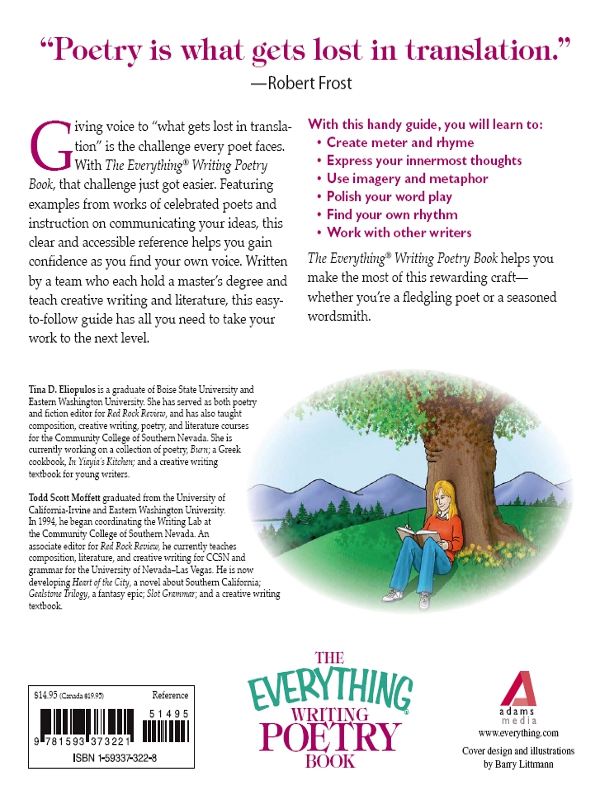
The EVERYTHING Series
Editorial
| Publishing Director | Gary M. Krebs |
| Managing Editor | Kate McBride |
| Copy Chief | Laura M. Daly |
| Acquisitions Editor | Gina Chaimanis |
| Development Editor | Katie McDonough |
| Production Editors | Jamie Wielgus Bridget Brace |
Production
| Production Director | Susan Beale |
| Production Manager | Michelle Roy Kelly |
| Series Designers | Daria Perreault |
| Colleen Cunningham |
| John Paulhus |
| Cover Design | Paul Beatrice |
| Matt LeBlanc |
| Layout and Graphics | Colleen Cunningham |
| John Paulhus |
| Daria Perreault |
| Monica Rhines |
| Erin Ring |
| Series Cover Artist | Barry Littmann |
Visit the entire Everything Series at www.everything.com
THE
EVERYTHING
WRITING POETRY
BOOK
A practical guide to style, structure, form, and expression
Tina D. Eliopulos and Todd Scott Moffett

Adams Media
Avon, Massachusetts
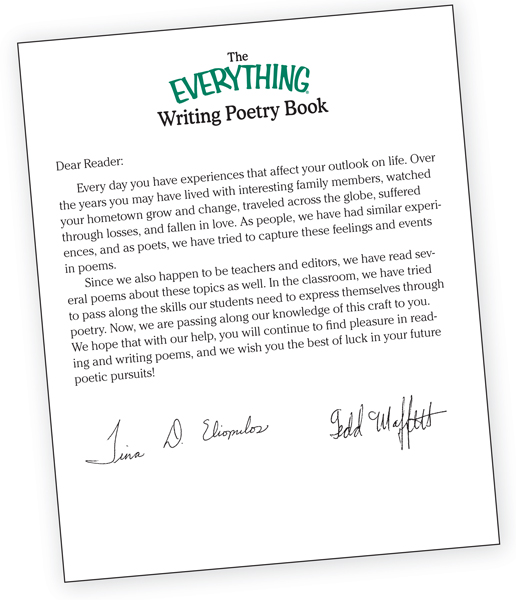
We dedicate this book to our own perfect poem, Madelynne Crisi Moffett
Copyright 2005, F+W Publications, Inc. All rights reserved.
This book, or parts thereof, may not be reproduced in any form without permission from the publisher; exceptions are made for brief excerpts used in published reviews.
An Everything Series Book.
Everything and everything.com are registered trademarks of F+W Publications, Inc.
Published by Adams Media, an F+W Publications Company
57 Littlefield Street, Avon, MA 02322 U.S.A.
www.adamsmedia.com
ISBN: 1-59337-322-8
Printed in the United States of America.
J I H G F E D C B A
Library of Congress Cataloging-in-Publication Data
Eliopulos, Tina D.
The everything writing poetry book / Tina D. Eliopulos and Todd Scott Moffett.
p.. cm.
(An everything series book)
ISBN 1-59337-322-8
1. PoetryAuthorship. I. Moffett, Todd Scott II. Title. III. Series: Everything series
PN1059A9E44 2005
808.1dc22
2005007437
This publication is designed to provide accurate and authoritative information with regard to the subject matter covered. It is sold with the understanding that the publisher is not engaged in rendering legal, accounting, or other professional advice. If legal advice or other expert assistance is required, the services of a competent professional person should be sought.
From a Declaration of Principles jointly adopted by a Committee of the American Bar Association and a Committee of Publishers and Associations
Many of the designations used by manufacturers and sellers to distinguish their products are claimed as trademarks. Where those designations appear in this book and Adams Media was aware of a trademark claim, the designations have been printed with initial capital letters.
This book is available at quantity discounts for bulk purchases.
For information, please call 1-800-872-5627.
Contents
Acknowledgments
We owe a debt of gratitude to the following individuals: for their expertise, professionalism, and collegiality, Barb Doyen of Doyen Literary Services, Gina Chaimanis, Lynn Best, Mary Dalton-Hoffman, and Jeredith Merrin; for their wisdom, humor, and friendship, Robert Sherfield and Richard Logsdon; and for their presence in our lives, the divine Yiayia of Las Vegas and the Moffetts of Laguna Beach.
Top Ten
Poetic Inspirations
1. Falling in love: Expressing the feelings of first love, fleeting romance, or a lasting relationship.
2. Falling out of love: Treasuring love, even when it leaves.
3. Becoming a parent: The softness of baby skin and the sound of first words.
4. Observing nature: From towering trees to trickling streams.
5. Traveling to faraway places: Foreign languages, exotic foods, and enchanting people.
6. Discovering something new about yourself or someone else: Something as small as a smile or as big as a career change.
7. Moving: To the next town or to a new nation.
8. Facing mortality: Coping with loss and confronting your own fate.
9. Finding humor: From laughing through troubling times to laughing with friends.
10. Uncovering your spirituality: Discovering your place in the world.
Introduction
 The ancient Greeks used the term furor poeticus to describe poetry as a frenzy sent by the gods. Through the centuries poetry has continued to amaze humankind. Ideas come to the poet unbidden, and then she must work them into polished pieces of art.
The ancient Greeks used the term furor poeticus to describe poetry as a frenzy sent by the gods. Through the centuries poetry has continued to amaze humankind. Ideas come to the poet unbidden, and then she must work them into polished pieces of art.
Many people first experience literary art in the form of poetry; take Mother Goose, for example. Many students fashion poems for school projects and others do so to nurse their broken hearts. Usually these creations get stuffed into scrapbooks only to be forgotten. For some reason, people often ignore the desire to express themselves, and they leave poetry writing to pop stars and academics. But to create true poetry you must not be afraid to identify your inner voice, indulge it, and set it free.
This book will help you find your poetic voice. We'll give you some poetic tools and teach you to use them. First, you'll learn how to tap sources of inspiration, choose a writing instrument, and pick the perfect place to do your work. Next, we will cover the writing process itself: creating and selecting significant details, using sound and language, and working with meter. The remainder of the book will acquaint you with the poetic forms (such as the sonnet and the ode), discuss ideas for subject matter, cover revision strategies, and guide you through the publishing process.
Once you have read this book, writing poems should be easier for younot easy, but easier. No matter how many books you read or how many ideas you are blessed with, writing poetry is rarely easy. You won't create poetry by thinking about it, reading about it, wishing you could write it, or talking about it with friendsthough these activities may provide motivation. Instead, the poetry will come from deep within you, flow through you, and even surprise you.
Practiced poets will tell you that they rarely, if ever, write a polished poem in a single draft. They make thousands of mistakes and deletions and have drawers full of early drafts, dead-end inspirations, and desperate scribbles. These same poets will tell you that such writing is never futile, but rather an inevitable and valuable part of the process.
The goal of this book is to inspire you to write and to keep writing. Several examples of professional poems and many writing exercises included here will give you plenty of guidance. But you will also need to try new methods to create more inspiration. You'll write lists, descriptions, and journal entries to get you on the right track. Always remember that every poet works differently, and that all talent takes time to develop. Be patient with yourself, enjoy the process, and don't be afraid to share your poetry with the world. Good luck!
Next page
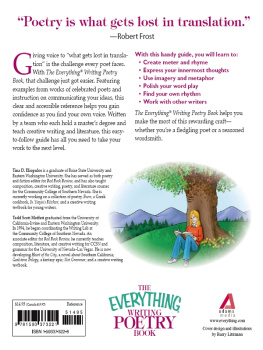
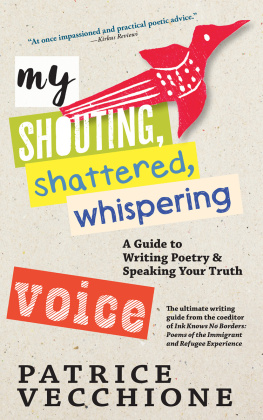
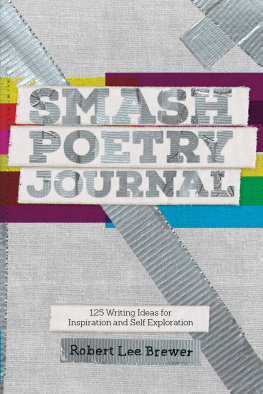
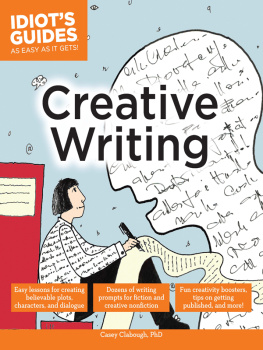


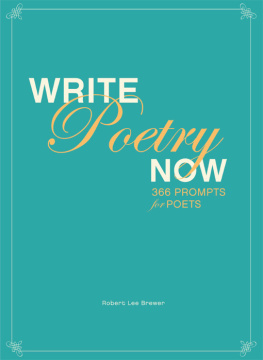
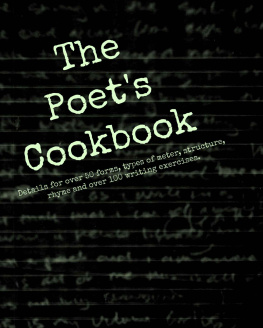
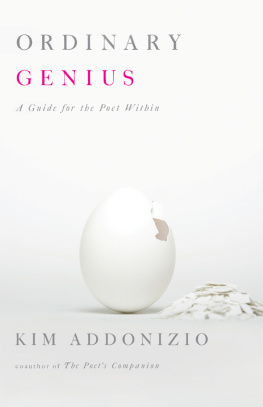
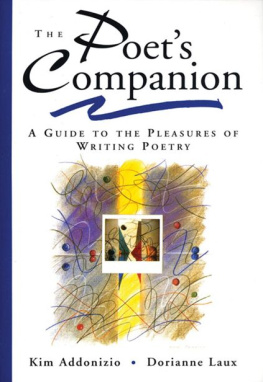
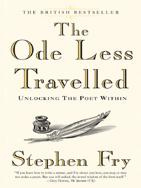



 The ancient Greeks used the term furor poeticus to describe poetry as a frenzy sent by the gods. Through the centuries poetry has continued to amaze humankind. Ideas come to the poet unbidden, and then she must work them into polished pieces of art.
The ancient Greeks used the term furor poeticus to describe poetry as a frenzy sent by the gods. Through the centuries poetry has continued to amaze humankind. Ideas come to the poet unbidden, and then she must work them into polished pieces of art.